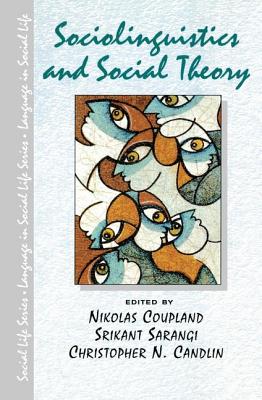Sociolinguistics and Social Theory brings together new critical overviews of the interface between language, social structure and social action. A wide range of theoretical and methodological traditions are represented: variationist and ethnographic sociolinguistics, conversation and interaction analysis, discourse analysis, social semiotics and ideological linguistics, as well as sociology and social theory itself. The book proposes a new agenda for sociolinguistic theory, in the broadest sense, and debates the theoretical grounding of different research methods. Contributors include Frederick Erickson, David Graddol, Christian Heath, Monica Heller, John Heritage, Gunther Kress, Per Linell, Michael Lynch, Miriam Meyerhoff, Lesley Milroy, Jonathan Potter, Ben Rampton, Celia Roberts, Richard Watts, John Wilson and Ruth Wodak.
The empirical and descriptive strengths of sociolinguistics, developed over more than 40 years of research, have not been matched by an active engagement with theory. Yet, over this time, social theorising has taken important new turns, linked in many ways to linguistic and discursive concerns. Sociolinguistics and Social Theory is the first book to explore the interface between sociolinguistic analysis and modern social theory. The book sets out to reunite sociolinguistics with the concepts and perspectives of several of the most influential modern theorists of society and social action, including Bakhtin, Foucault, Habermas, Sacks, Goffman, Bourdieu and Giddens. In eleven newly commissioned chapters, leading sociolinguists reappraise the theoretical framing of their research, reaching out beyond conventional limits. The authors propose significant new orientations to key sociolinguistic themes, including-
- social motivations for language variation and change
- language, power and authority
- language and ageing
- language, race and class
- language planning
In substantial introductory and concluding chapters, the editors and invited discussants reassess the boundaries of sociolinguistic theory and the priorities of sociolinguistic methods. Sociolinguistics and Social Theory encourages students and researchers of sociolinguistics to be more reflexively aware and critical of the social bases of their analyses and invites a reasessment of the place sociolinguistics occupies in the social sciences generally.
Get Sociolinguistics and Social Theory by at the best price and quality guranteed only at Werezi Africa largest book ecommerce store. The book was published by Taylor & Francis Ltd and it has pages. Enjoy Shopping Best Offers & Deals on books Online from Werezi - Receive at your doorstep - Fast Delivery - Secure mode of Payment
 Jacket, Women
Jacket, Women
 Woolend Jacket
Woolend Jacket
 Western denim
Western denim
 Mini Dresss
Mini Dresss
 Jacket, Women
Jacket, Women
 Woolend Jacket
Woolend Jacket
 Western denim
Western denim
 Mini Dresss
Mini Dresss
 Jacket, Women
Jacket, Women
 Woolend Jacket
Woolend Jacket
 Western denim
Western denim
 Mini Dresss
Mini Dresss
 Jacket, Women
Jacket, Women
 Woolend Jacket
Woolend Jacket
 Western denim
Western denim
 Mini Dresss
Mini Dresss
 Jacket, Women
Jacket, Women
 Woolend Jacket
Woolend Jacket
 Western denim
Western denim
 Mini Dresss
Mini Dresss






























































